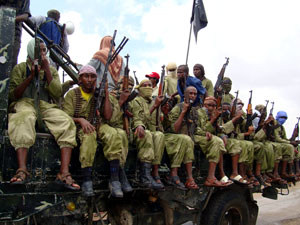 Al-Shabaab Islamist fighters sit on a truck as they patrol to provide security for Somali demonstrators in Mogadishu, Somalia Oct. 30, 2009. A recent report from the Council on Foreign Relations said the existing U.S. strategy of backing weak governments against Islamist groups in the region is "counter productive." Photo: AP/Wide World Photos |
hifting alliances and the destruction of graves belonging to Islamic saints and scholars presents a picture of the bloody factionalism that continues to plague Somalia, while the UN-backed government is weakened by its own corruption.
Mogadishu, Somalia - In the same week that a report published by the UN’s Monitoring Group in Somalia revealed rampant corruption by the country’s Transitional Federal Government (TFG), stifling the flow of international donor money, a pledge of allegiance to the government from a potentially valuable faction proved conditional. On March 17 the TFG signed an agreement with the Sufi militia Ahlu Sunna Wa’l-Jama’a gaining their support against the al Qaeda linked al Shabaab in exchange for five ministerial posts and senior positions in the military, police and intelligence service, according to one report "With this agreement, the government of Somalia and Ahlu Sunna Wa’l-Jama’a have taken an essential step in the strategy towards restoring peace and stability to our beloved country," Somalia’s Prime Minister Omar Abdirashid Ali Sharmarke told reporters. "It is a victory for peace and a cursed defeat for spoilers and extremist groups." The Ahlu Sunna is an umbrella group of Sufi orders that has come into sharp conflict with al Shabaab’s salafist campaign attacking clerics and scholars that differ in their aims, alliances or clan affiliation. The destruction of tombs belonging to revered Muslims by al Shabaab illustrates their takfiri ideology that targets “apostate” groups, resulting in the militarisation of Ahlu Sunna in contested areas. The alliance against al Shabaab appears logical and a welcome development for the TFG, which relies on the 5,300-strong African Union Mission in Somalia (AMISOM) force of Ugandan and Burundi soldiers for security. Ahlu’s troops and intelligence would greatly increase the effectiveness of any offensive against insurgents in the south. Though the pact received the blessing of the Arab League, the UN Special Envoy, the African Union and Organisation of the Islamic Conference, one faction within the Ahlu Sunna, led by its foreign relations officer Shaykh Bashir Abdi Olaad, condemned the agreement as an act to sabotage the sufi group’s unity. “This agreement was a betrayal which is meant to hijack the group. We are making it clear that we do not recognise [the agreement] but also we are not opposed to the government,” one dissenting member of the group said. Ahlu Sunna’s suspected links to Ethiopia further complicate the legitimacy of the arrangement, angering Somalis whom suffered at the hands of Ethiopian troops during their 2006 invasion to eject the Islamic Courts Union who had taken over most of the southern half of Somalia including all of Mogadishu earlier that year. The expected spring offensive against insurgents who have control over parts of the capital and most of the south will be seriously hampered, not in the least by a counter offensive by the leading insurgency groups in the capital who enjoy more public support than the TFG in some cases. The current president of the TFG, Sheikh Sharif Sheikh Ahmad is the former commander of the now defunct Islamic Courts Union, which was comprised of many of the leading figures of the insurgency groups his government fights today. As the fighting intensifies, spilling into neighbouring Kenya and Ethiopia, the TFG will come under increasing pressure to step-up against al Shabaab strategy to globalise its struggle much like Afghanistan earlier attracted international fighters into its war. Rumours continue to point to a more conspicuous U.S. military presence to counter al Qaeda’s regional successes in the Horn of Africa, a scenario that U.S. officials deny.

No comments:
Post a Comment